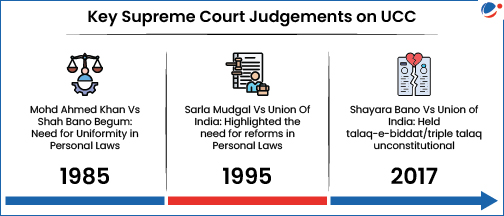Earlier this year, Uttarakhand Assembly’s UCC Bill received President’s assent paving the way for the State to potentially become the first state in India to enact the UCC.
About UCC
- Meaning: It seeks to establish a set of uniform personal laws applicable to all citizens, regardless of religion, gender, or caste covering matters like marriage, divorce, adoption, inheritance, and succession.
- Constitutional Provisions: Directive Principles of State Policy (Part IV) under Article 44 provides for the State to secure for the citizens a UCC throughout the territory of India.
- Current Status: Presently, such matters are governed by the respective religious laws.
- Goa through Portuguese Civil Code, 1867 has provisions similar to UCC.
Need for UCC
- Gender Equity: Laws governing marriage, divorce, etc., often discriminate against women.
- Social Cohesion: Religious and ethnic diversity in India's legal system can create divisions.
- Reforming Indian Society: Counteract many superstitious and ultra-conservative practices prevalent in the society in the name of faith and belief.

Major challenges in Implementing UCC
- Ensuring a Balance between Individual Rights and State Intervention: Article 25 guarantees the freedom of religion, 5th and 6th Schedule ensures protections to tribal customs and beliefs.
- Opposition from Religious groups and leaders: On the grounds that it could interfere with their religious laws and customs creating social and political tensions.
Conclusion
There is a need to devise a secular code with its emphasis not on imposing uniformity but rather upholding the Constitutional principles of equality, justice, and inclusivity.






